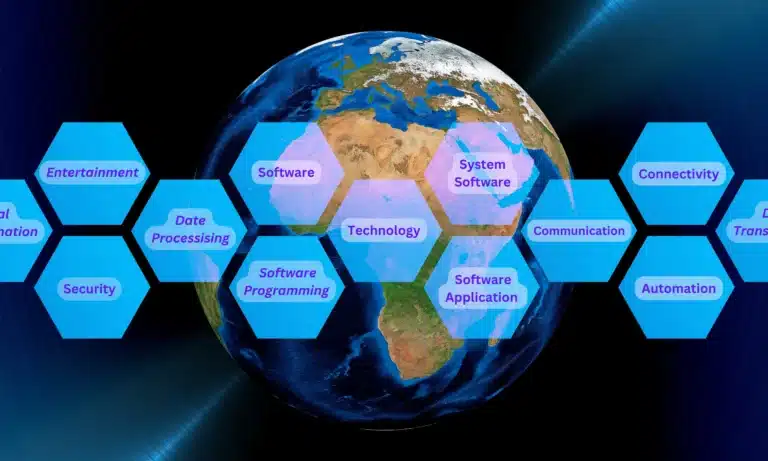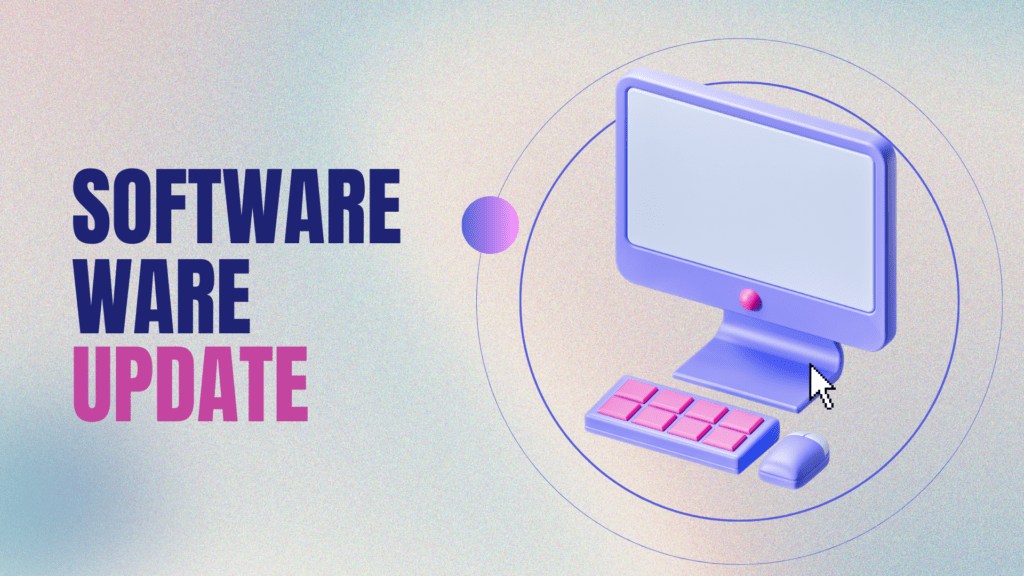Technology means using science to create tools and ideas that make life easier and solve problems. It includes things like phones, computers, machines, and methods to do things better. Technology keeps improving and helps in areas like communication, health, and travel.

Back Bone of Technology

Software is the core of modern technology, powering the functionality of devices ranging from personal computers and smartphones to complex industrial systems and sophisticated machinery.
It acts as the critical link that allows hardware to perform specific tasks, making everyday activities like browsing the web, playing video games, or processing data possible. These programs, developed by skilled professionals, are tailored to meet a wide variety of needs, from personal productivity and entertainment to large-scale industrial operations.
Every interaction with a computer or device relies on software that manages production lines.
This article delves into the different types of software, their functions, why they are essential for the advancement of technology.
What is Software?
Software is the hidden power behind almost every technological device in the modern world.
At its core, software is a set of instructions or collection of code written by developers that tell a computer or device how to perform specific tasks. It acts as a bridge between users and hardware, enabling seamless interaction. Without software, enabling devices to carry out functions, from simple operations like calculations to complex processes such as data analysis or system management.
“Software is a collection of commands or code that directs a computer or device to execute particular tasks.”
software helps
The importance of software extends beyond individual tasks. It drives innovation in industries such as healthcare, finance, education, and manufacturing. Software enhances productivity, automates repetitive processes, and connects people globally through communication platforms and collaborative tools. Additionally, it plays a vital role in ensuring cybersecurity and safeguarding sensitive information.
As technology continues to evolve, the role of software becomes increasingly significant in shaping the future. It is not just a tool but a transformative force that enables progress, revolutionizes industries, and improves quality of life on a global scale.
Three main categories of software is typically classified:
Types of Software
1. System Software:
- Examples: Operating systems like macOS, Linux, and Windows
- Purpose: Controls hardware and provides a base for other programs to run.
- Functions: Manages resources like memory and processes to keep devices working smoothly.
2. Application Software:
- Examples: Word processors, games, and apps like Netflix or Facebook.
- Purpose: Designed for specific tasks like creating documents, gaming, or watching videos.
3. Programming Software:
- Examples: Tools like Visual Studio and Sublime Text.
- Purpose: Helps developers write, test, and debug code.
Functions of Software
Software is designed to simplify and enhance various activities by performing specific functions across different domains. Below are the key functions of software, along with examples and their significance.
1. Data Processing
Software plays a critical role in handling, storing, and analyzing data, making it a cornerstone of modern decision-making and operations.
- Purpose: Organizes raw data into meaningful information, making it easier to interpret and use.
Examples:
- Microsoft Excel: Used for data entry, calculations, and creating charts.
- SQL (Structured Query Language): A tool for managing and querying databases.
- Google Analytics: Tracks and analyzes website traffic and user behavior.
- SAP: Enterprise software for large-scale data processing and reporting.
Importance:
Data processing software helps businesses and individuals make informed decisions, detect trends, and streamline operations efficiently.
2. Communication
Communication software enables individuals and organizations to connect, share information, and collaborate in real-time.
- Purpose: Facilitates the exchange of messages, data, and files over networks.
Examples:
- Email Clients: Microsoft Outlook, Gmail.
- Messaging Apps: WhatsApp, Slack, Microsoft Teams.
- Video Conferencing Tools: Google Meet, Skype, Zoom.
- Social Media Platforms: Facebook, Twitter, Instagram.
Importance:
These tools are essential for personal connections, remote work, customer communication, and maintaining global relationships.
3. Automation
Automation software reduces human effort by performing repetitive tasks accurately and efficiently.
- Purpose: Saves time, minimizes errors, and enhances productivity by automating routine processes.
Examples:
- Zapier: Automates workflows by connecting different apps.
- QuickBooks: Manages business finances and accounting tasks.
- Customer Relationship Management (CRM) Tools: Salesforce automates customer data handling and sales processes.
- Smart Home Applications: Google Home and Alexa automate household tasks like turning lights on or adjusting the thermostat.
Importance:
Automation software is widely used in industries like manufacturing, healthcare, and e-commerce, where efficiency and consistency are crucial.
4. Entertainment
Entertainment software provides fun, relaxation, and creative outlets for users through digital experiences.
- Purpose: Delivers interactive and multimedia content for enjoyment.
Examples:
- Gaming Software: Minecraft, Fortnite, Call of Duty.
- Streaming Platforms: Netflix, YouTube, Spotify.
- Creative Tools: Canva for graphic design, Adobe Photoshop for photo editing.
- VR and AR Apps: Oculus VR, Pokémon GO.
Importance:
Entertainment software is integral to leisure activities, offering diverse options for gaming, streaming, music, and creativity.
5. Security
Security software safeguards devices and data from online threats and cyberattacks.
Purpose:
Prevents unauthorized access, detects and removes threats, and safeguards sensitive information.
Examples:
- Antivirus Software: Norton, Avast, McAfee.
- Firewall Tools: Windows Defender Firewall, ZoneAlarm.
- Encryption Software: VeraCrypt, BitLocker.
- Password Managers: LastPass, Dashlane, 1Password.
- Network Security Tools: Wireshark, Snort.
Importance:
- Protects devices and data from malware, hacking, and cyberattacks.
- Ensures privacy by encrypting sensitive information.
- Secures online transactions, preventing fraud and identity theft.
- Maintains business continuity by reducing downtime and mitigating security breaches.
Assists businesses in adhering to data protection laws and regulations.
Importance of Software in Today’s World
Software is central to modern technological progress, influencing our daily lives, businesses, and the global economy. Here’s why software holds such significance:
- Driving Innovation: Software powers advancements in industries like healthcare, education, finance, and manufacturing. For example, medical software has transformed diagnostics and treatment, while educational platforms have opened up new learning opportunities worldwide.
- Boosting Efficiency: With the help of software, individuals and businesses can complete tasks quickly and accurately. Automation and data processing features allow tasks that once took hours to be done in minutes, saving time and reducing errors.
- Enhancing Connectivity: From communication platforms to collaborative tools and social media, the software enables people to connect and interact in real-time, no matter the distance. How we work, socialize, and share information has revolutionized.
- Enabling Digital Transformation: Software is the backbone of digital transformation, helping businesses shift from traditional models to more agile, data-driven, and tech-focused operations. This ability to adjust is crucial for staying competitive in today’s rapidly changing world.
- Ensuring Security and Privacy: With rising cyber threats, security software is essential for protecting digital assets. Tools like encryption, firewalls, and malware detection safeguard sensitive information and ensure privacy in an increasingly connected environment.
Conclusion
Software is the foundation of modern technology, enabling innovation, enhancing efficiency, and fostering global connectivity. It bridges hardware and users, transforming data into meaningful actions and interactions. From improving industries like healthcare and finance to automating tasks and ensuring security, software plays a crucial role in everyday life. It powers communication, entertainment, and digital transformation, helping businesses adapt to a tech-driven world. As technology evolves, software’s importance continues to grow, shaping the future and driving progress across all sectors. Understanding its functions and benefits is essential for navigating and succeeding in the increasingly digital world.
